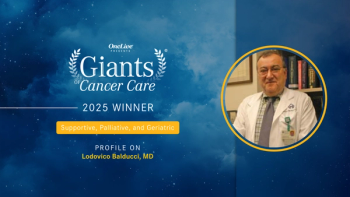
Options in the Third Line Setting for RCC
Transcript:Nizar M. Tannir, MD: I think this is a situation where regardless of which one you’re going to go to second-line, whether it’s nivolumab or cabozantinib, patients now are doing well, they can go to the third-line. Whereas, in the past, even at MD Anderson, only one-third of the patients made it to a third-line therapy, and 60% made it to second-line therapy. Now, with all these drugs, all these therapies, we are seeing patients go to first-line, second-line, third-line, fourth-line, etc. So, I have scenarios where patients can get nivolumab for second-line and then after they progress, they go to cabozantinib, and then the opposite sequence—cabozantinib and then nivolumab. Then, both patients are going to respond to both agents. That’s the nice thing about these two agents, we’ve seen patients respond in the third-line and after, whether they receive cabozantinib or nivolumab in the second-line. I can’t say that about lenvatinib because it’s a second-line therapy. We don’t know how the lenvatinib/everolimus combination is going to perform as third-line or fourth-line because we don’t have data on that.
Robert A. Figlin, MD: So, Nizar, tell me a little bit about your personal experience with cabozantinib and patients in whom you’ve used it. You talked a little bit before about how many patients required a dose reduction, that the median dose given was 44 mg in the pivotal trial. Tell us about your own personal experience.
Nizar M. Tannir, MD: I think it’s a drug that has value. If you look at the cost as well, you think that it is in the field where it’s $10,000 or $15,000. This is a drug that, as I said earlier, produces a good regression—so good median progression-free survival of 7.4 months. And that was held back with longer follow-up. I think that translates to something the patient can wrap their arms around and see that their tumor is shrinking and they have improvement of symptoms. Especially, I found it to be effective—and a drug that I like to go to—in patients with a bone metastasis phenotype. And, actually, if you go back to look at the history, that drug was thought to be the best in prostate cancer. We know that the data there were negative.
This is a drug that, unlike the first-generation VEGFR TKIs, pazopanib, and sunitinib—the distinction from the other mechanism of action is that patients with bone metastases do really actually respond. We’ve seen patients in my own practice. I know of many patients on the METEOR trial but even off protocol treating those patients with the agent. And some of them are already on it as the third-, fourth-, fifth-line. After a year, a year-and-a-half and they’re still doing well. So, you need to know how to manage and be proactive managing the adverse events. I think the drug does have activity even at the 40-mg dose if you really need to go down there.
I think, overall, it’s good to hear that the secondary endpoint was met and it was powered to be looked at in that way, and it did show survival. We’ll hear about it in 2 days, but it’s impressive that this drug provided OS, as well as PFS and a response rate after TKI in the high teens. In that regard, I see it as a clear advanced progress over axitinib, where it did not give you the OS. And post-sunitinib, the response rate was 11% and the median PFS 4.8 months. This one is 7.4 months. In my practice of protocol, I certainly will place it higher in the ranking, in the order what I will use it over axitinib, certainly over everolimus alone.
Robert A. Figlin, MD: Yes. Our own experience is very similar. In fact, in the kidney cancer world, we’re very used to VEGFR toxicities. I think that in the prostate world, they were maybe not as used to that as we had been over the last decade. And we’ve certainly not seen with appropriate dose modification, stopping and starting, management of toxicities, anything that would have been unexpected and out of proportion of the other VEGFR-related inhibitors.
Transcript Edited for Clarity



































